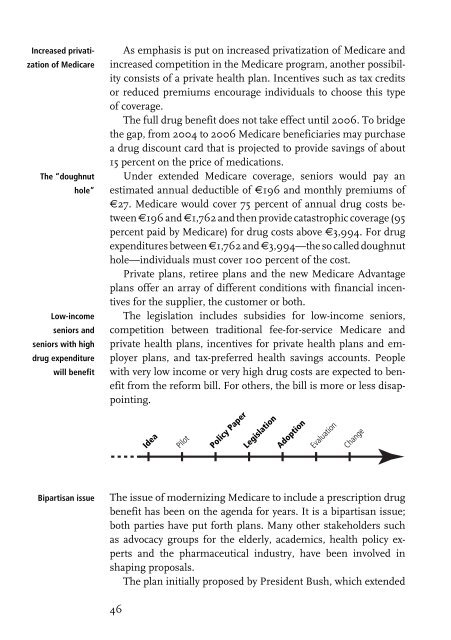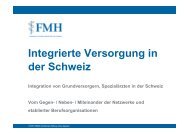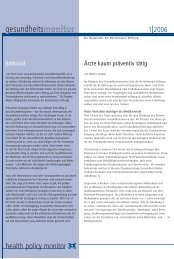The 2nd HPD report - Health Policy Monitor
The 2nd HPD report - Health Policy Monitor
The 2nd HPD report - Health Policy Monitor
- TAGS
- health
- policy
- monitor
- www.hpm.org
Create successful ePaper yourself
Turn your PDF publications into a flip-book with our unique Google optimized e-Paper software.
Increased privatization<br />
of Medicare<br />
<strong>The</strong> “doughnut<br />
hole”<br />
Low-income<br />
seniors and<br />
seniors with high<br />
drug expenditure<br />
will benefit<br />
As emphasis is put on increased privatization of Medicare and<br />
increased competition in the Medicare program, another possibility<br />
consists of a private health plan. Incentives such as tax credits<br />
or reduced premiums encourage individuals to choose this type<br />
of coverage.<br />
<strong>The</strong> full drug benefit does not take effect until 2006. To bridge<br />
the gap, from 2004 to 2006 Medicare beneficiaries may purchase<br />
a drug discount card that is projected to provide savings of about<br />
15 percent on the price of medications.<br />
Under extended Medicare coverage, seniors would pay an<br />
estimated annual deductible of €196 and monthly premiums of<br />
€27. Medicare would cover 75 percent of annual drug costs between<br />
€196 and €1,762 and then provide catastrophic coverage (95<br />
percent paid by Medicare) for drug costs above €3,994. For drug<br />
expenditures between €1,762 and €3,994—the so called doughnut<br />
hole—individuals must cover 100 percent of the cost.<br />
Private plans, retiree plans and the new Medicare Advantage<br />
plans offer an array of different conditions with financial incentives<br />
for the supplier, the customer or both.<br />
<strong>The</strong> legislation includes subsidies for low-income seniors,<br />
competition between traditional fee-for-service Medicare and<br />
private health plans, incentives for private health plans and employer<br />
plans, and tax-preferred health savings accounts. People<br />
with very low income or very high drug costs are expected to benefit<br />
from the reform bill. For others, the bill is more or less disappointing.<br />
Idea<br />
Pilot<br />
<strong>Policy</strong> Paper<br />
Legislation<br />
Adoption<br />
Evaluation<br />
Bipartisan issue <strong>The</strong> issue of modernizing Medicare to include a prescription drug<br />
benefit has been on the agenda for years. It is a bipartisan issue;<br />
both parties have put forth plans. Many other stakeholders such<br />
as advocacy groups for the elderly, academics, health policy experts<br />
and the pharmaceutical industry, have been involved in<br />
shaping proposals.<br />
<strong>The</strong> plan initially proposed by President Bush, which extended<br />
46<br />
Change






